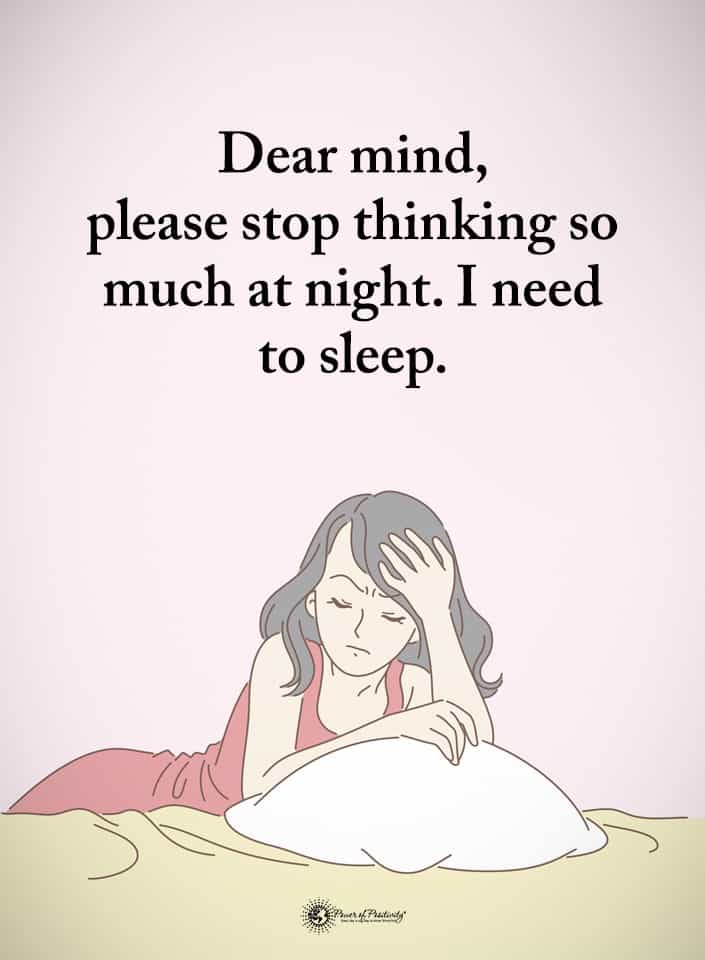Ever find yourself dragging through the day, wondering why you feel exhausted no matter how much sleep you get? You’re not alone—millions of people struggle with unexplained fatigue. In fact, studies show that up to 38% of adults report experiencing persistent tiredness.
But here’s the truth: Fatigue isn’t always about needing more sleep. From lifestyle habits to underlying health issues, a wide range of factors could be silently draining your energy.
If you’ve ever asked yourself, “Why do I feel tired all the time?” this article will walk you through the most common culprits and practical solutions you can apply today.
So, whether your fatigue stems from stress, diet, or medical issues, we’ve got you covered. Read on to discover what might be sapping your energy—and, more importantly, how you can reclaim it.
“When we are tired, we are attacked by ideas we conquered long ago”
15 Common Habits That Make You Feel Tired all the Time
Negative Thoughts
Negative thoughts drain emotional and mental energy by fostering anxiety, stress, and low mood. This mental strain, also known as cognitive fatigue, arises from constant rumination—where the brain focuses on negative scenarios and self-doubt.
Over time, this leads to increased mental exhaustion, poor concentration, and reduced motivation. It also affects physical well-being, with chronic overthinking linked to disrupted sleep, headaches, and heightened anxiety, which further deplete energy reserves.
Lack of Exercise
Lack of physical activity leads to poor circulation, reduced oxygen supply to muscles, and mental fog, all of which contribute to fatigue.
Studies indicate that even low-intensity activities—such as leisurely walks—can reduce fatigue by up to 65%, with greater improvements compared to moderate-intensity workouts for individuals already feeling fatigued.
- Regular movement promotes blood flow and reduces muscle stiffness
- Low-intensity activities improve energy levels more than moderate workouts
- Exercise enhances cognitive function, alleviating mental fatigue
- Physical activity supports stress management and better sleep.
Medical Conditions
Certain medical conditions can cause chronic fatigue, even when sleep, nutrition, and exercise are optimized. Anemia, characterized by a reduction in red blood cells, limits oxygen delivery to tissues, leading to persistent tiredness and shortness of breath.
Thyroid disorders, such as hypothyroidism, slow down metabolic processes, causing energy depletion and weight gain. Similarly, diabetes can result in erratic blood sugar levels, draining energy and making daily activities exhausting.
Chronic fatigue syndrome (CFS) remains a medical enigma, with unexplained fatigue persisting even with rest and minimal exertion.
Major Life Events
Significant life changes—such as grief, divorce, and job loss—can lead to emotional fatigue, impacting mental well-being and physical energy levels.
These events trigger stress responses that affect mood, sleep, and motivation, creating persistent tiredness.
- Grief-related fatigue arises from emotional processing and disrupted sleep patterns
- Divorce and separation often cause stress-related symptoms, including low energy and concentration difficulties
- Job loss triggers uncertainty and anxiety, further depleting mental resources
- Prolonged emotional fatigue can impair daily functioning and require focused coping strategies.
Poor Diet and Nutrition
Poor nutrition leads to fatigue by depriving the body of essential nutrients like iron, Vitamin D, and magnesium.
Diets high in sugar cause energy crashes, while chronic deficiencies impair mental clarity and physical stamina. Imbalanced diets also promote inflammation, exacerbating tiredness and cognitive exhaustion.
A balanced intake of proteins, complex carbs, and micronutrients is essential for maintaining steady energy levels and mental well-being.
Sleep Disorders
Sleep disorders, such as insomnia and sleep apnea, impair the body’s ability to achieve restorative sleep, resulting in persistent daytime fatigue.
Even minor disruptions in sleep quality can affect mood regulation, cognitive function, and energy levels, leading to exhaustion despite sufficient sleep hours.
- Sleep disruptions hinder deep sleep stages essential for physical recovery
- Chronic sleep loss increases appetite and impairs glucose regulation, promoting fatigue
- Disorders like insomnia trigger stress responses, worsening daytime tiredness
- Even with treatment, some individuals may continue experiencing fatigue.
Lack of Social Interaction
Social interaction plays a critical role in maintaining mental and physical well-being. Prolonged social isolation disrupts emotional regulation, leading to increased fatigue, depression, and cognitive decline.
Without regular social contact, individuals may experience lethargy, stress, and sleep disturbances, which further deplete their energy levels. Additionally, loneliness weakens immune function, making the body more susceptible to illness and prolonged exhaustion.
Engaging in social activities—even small ones like phone calls or brief social interactions—can significantly improve mood and energy, reducing the burden of fatigue over time.
Boredom and Lack of Purpose
Boredom and a lack of purpose can contribute significantly to mental and physical fatigue. When individuals find their daily activities meaningless, it can lead to emotional disengagement, leaving them mentally exhausted and unmotivated.
This emotional state reduces cognitive flexibility, making it harder to focus and increasing fatigue over time.
- Boredom signals a need to find new challenges or meaningful activities
- Lack of purpose diminishes motivation, contributing to mental fatigue
- Chronic boredom can increase stress, creating a cycle of exhaustion and dissatisfaction
- Meaningful engagement, such as hobbies or volunteering, restores energy and alleviates fatigue.
Overweight and Obesity
Carrying excess weight significantly contributes to fatigue by straining the body’s energy systems.
Obesity reduces endurance, as muscles need more effort to support increased body mass, leading to quicker exhaustion during physical activities.
- Obesity causes muscle fatigue and reduces stamina during daily tasks
- Poor circulation limits oxygen delivery, exacerbating fatigue
- Increased body weight places pressure on joints, making physical movement more tiring
- Engaging in regular activity—even without weight loss—can boost energy and improve overall function.
Mental Heath Issues
Mental health disorders, such as depression and anxiety, can significantly contribute to chronic fatigue. Emotional stress drains mental energy, disrupts sleep, and affects daily functioning.
Depression often manifests with a persistent lack of motivation, sluggishness, and cognitive impairments, all of which lead to exhaustion.
Similarly, anxiety keeps the body in a heightened state of alertness, depleting energy reserves and making it harder to rest or recharge.
Individuals with these conditions frequently report difficulty concentrating and low energy, which can worsen without treatment.
Smoking and Alcohol Consumption
Both smoking and alcohol consumption disrupt sleep patterns and reduce energy levels, contributing to persistent fatigue. Smoking increases oxidative stress and inflammation, which impairs muscle function and recovery.
Alcohol, especially when consumed excessively, affects sleep cycles by disrupting deep sleep stages, leading to poor-quality rest and daytime tiredness.
- Smoking increases oxidative stress, leading to chronic fatigue
- Alcohol disrupts deep sleep, causing daytime tiredness
- Both habits impair nutrient absorption, contributing to fatigue.
Excessive Screen Time
Prolonged exposure to screens, especially before bedtime, disrupts sleep by exposing the eyes to blue light, which interferes with melatonin production—a hormone essential for sleep regulation.
This disruption can delay the onset of sleep, shorten total sleep duration, and lower sleep quality, resulting in daytime fatigue.
- Blue light exposure delays melatonin release, disrupting circadian rhythms
- Poor sleep from screen use results in cognitive fatigue during the day
- Consistent screen use before sleep lowers sleep quality and impairs focus
- Limiting screen exposure in the evening helps restore healthy sleep patterns.
Chronic Fatigue Syndrome
Extreme fatigue that doesn’t go away with rest is a defining feature of Chronic Fatigue Syndrome (CFS), also known as myalgic encephalomyelitis. This condition impacts cognitive function, immune response, and energy metabolism, leaving individuals persistently exhausted.
Even minimal physical or mental effort can trigger severe fatigue, known as post-exertional malaise, which distinguishes CFS from general tiredness. Researchers link CFS to neurological and immune dysfunction, though its exact cause remains unknown.
Stress and Anxiety

Chronic stress and anxiety significantly contribute to fatigue by keeping the body’s stress response system overactivated.
When stress hormones like cortisol remain elevated, the body struggles to restore its natural balance, leading to persistent exhaustion.
- Prolonged stress disrupts sleep patterns, worsening daytime fatigue and mental exhaustion
- Elevated cortisol levels impair memory and focus, causing cognitive fatigue
- Anxiety-induced muscle tension adds to physical tiredness, creating a cycle of stress and exhaustion
- Managing stress through relaxation techniques, exercise, and healthy social connections can mitigate fatigue symptoms.
Vitamin and Mineral Deficiencies
A deficiency in essential vitamins and minerals can hinder energy production, leading to persistent fatigue and decreased mental and physical performance.
These nutrients play crucial roles in processes like oxygen transport, metabolism, and nerve function.
Here are 10 key vitamins and minerals known to impact energy levels:
- Vitamin D
- Vitamin B12
- Iron
- Magnesium
- Vitamin C
- Calcium
- Potassium
- Zinc
- Folate
- Omega-3 Fatty Acids
How to Combat Fatigue and Stop Feeling Tired
Here are targeted strategies to fight fatigue, focusing on essential lifestyle habits for energy restoration:
- Maintain consistent sleep schedules, avoid screens before bedtime, and create a calm sleep environment to optimize rest
- Engage in moderate physical activities like walking or yoga to boost energy and enhance mood. Regular movement also improves sleep quality
- Incorporate whole foods, lean proteins, and complex carbohydrates to maintain steady energy levels and prevent nutrient deficiencies
- Stay connected with family and friends to enhance emotional well-being and reduce the mental exhaustion that comes from isolation
- Use relaxation methods such as deep breathing, meditation, or journaling to manage stress effectively and prevent burnout.
Bye Fatigue, Hello Vitality!
Fatigue may feel overwhelming, but with the right strategies, you can regain your energy and zest for life.
Whether it’s tweaking your sleep routine, embracing movement, or fueling your body with balanced nutrition, small changes make a big impact.
Surrounding yourself with positive connections and managing stress effectively will also keep exhaustion at bay.
Remember, tiredness doesn’t have to run your life—start making thoughtful adjustments today, and you’ll soon be saying, “Fatigue, who?”






























